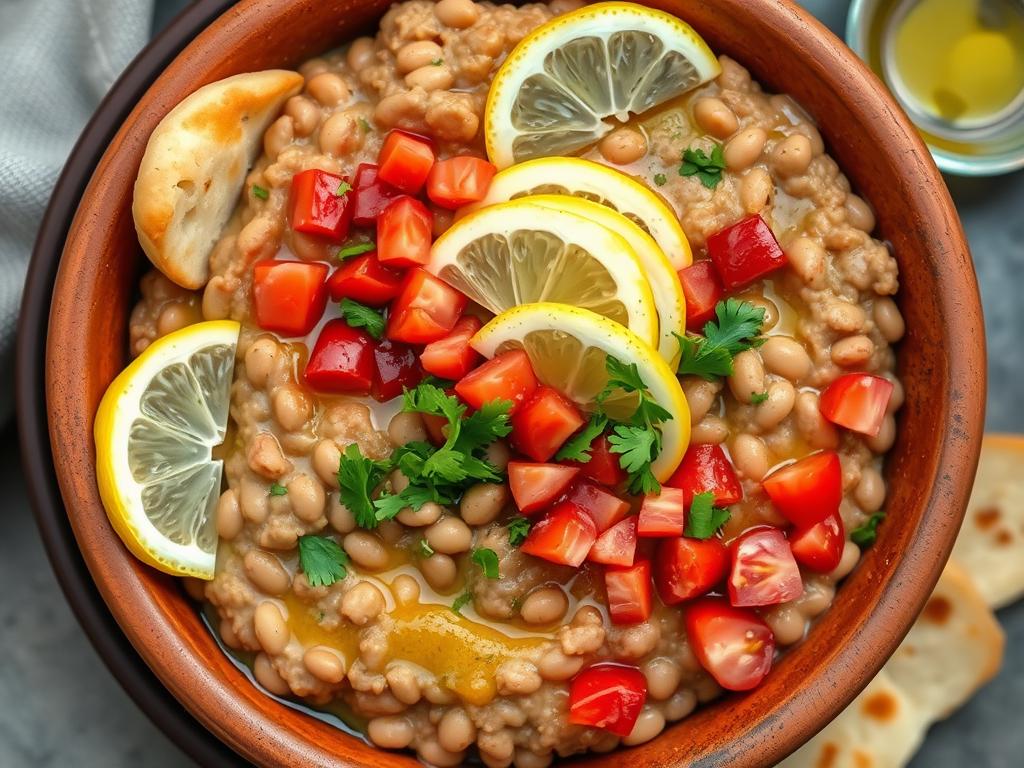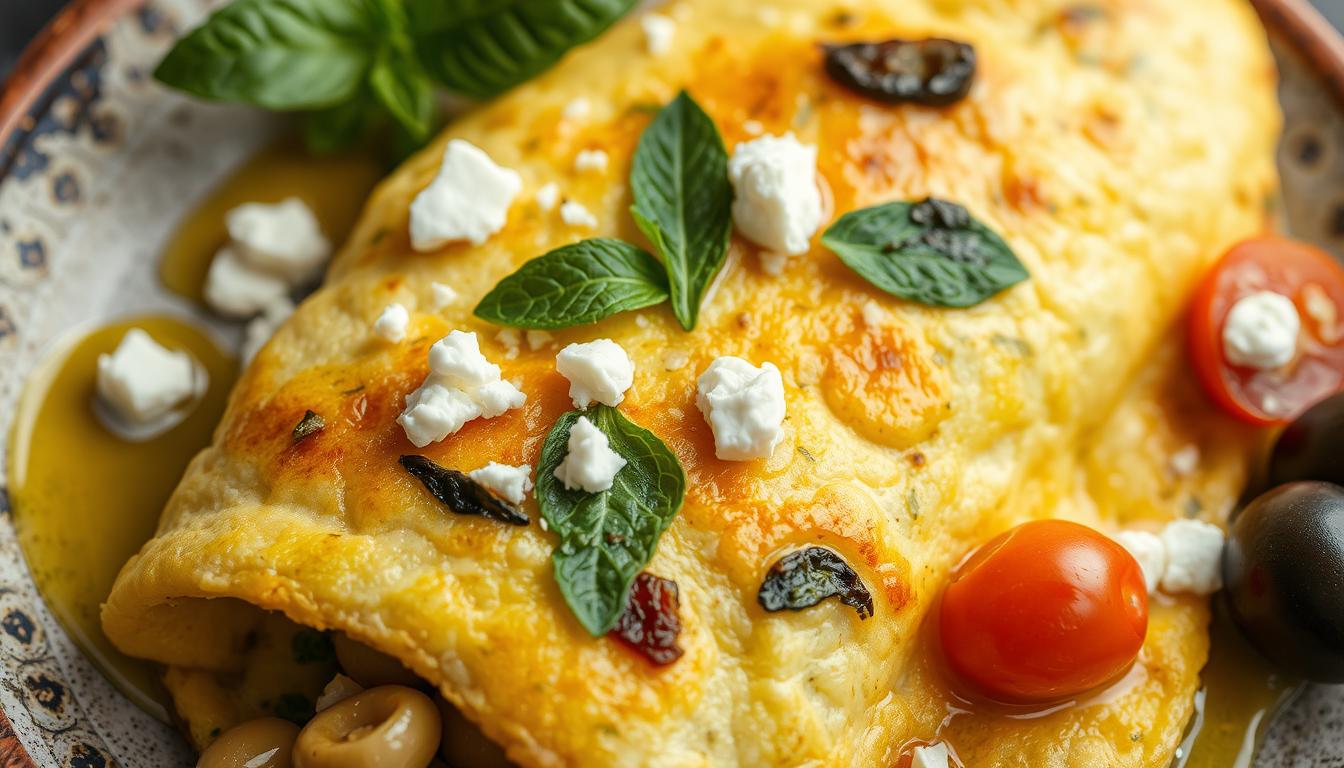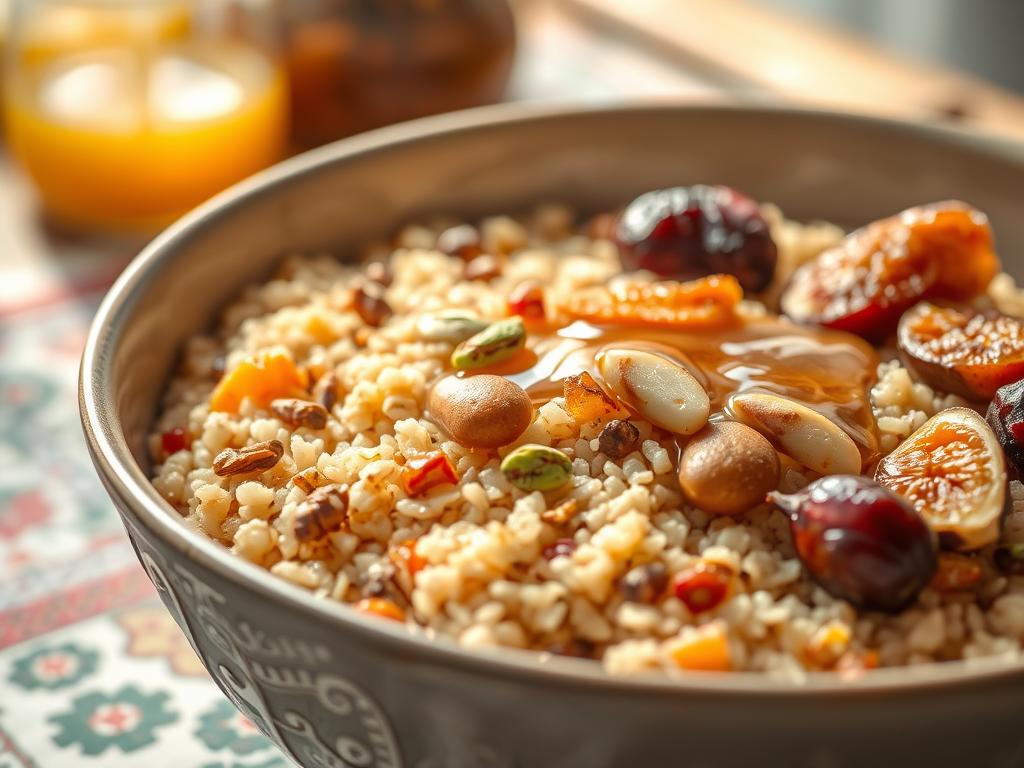The Importance of Breakfast in Mediterranean Culture
In Mediterranean countries, breakfast is approached differently than in Western cultures. Rather than heavy, processed foods, Mediterranean breakfasts emphasize fresh, seasonal ingredients that provide sustained energy. Olive oil, whole grains, fruits, vegetables, and proteins like eggs and yogurt form the foundation of these morning meals.
What makes authentic Mediterranean breakfast ideas so special is their balance of nutrition and flavor. These traditional dishes have evolved over centuries to provide the perfect start to busy days of farming, fishing, and active lifestyles. Today, research confirms what Mediterranean cultures have known for generations these breakfast patterns contribute to heart health, longevity, and overall wellbeing.
1. Greek Yogurt with Honey and Nuts (Greece)

Cultural Context
Perhaps the most iconic authentic Mediterranean breakfast idea from Greece, this simple combination has been enjoyed for centuries. Greek shepherds would make fresh yogurt from sheep’s milk, then sweeten it with local honey for a protein-rich start to their day.
Ingredients
- 2 cups thick, full-fat Greek yogurt
- 2-3 tablespoons high-quality honey
- ¼ cup mixed nuts (walnuts, almonds, pistachios)
- Optional: fresh seasonal fruit or a sprinkle of cinnamon
Preparation
Spoon the yogurt into bowls, drizzle generously with honey, and top with chopped nuts. For an authentic touch, use Greek thyme honey, which has a distinctive flavor from bees that pollinate wild thyme plants on the Greek hillsides. The combination of protein-rich yogurt, natural sweetness from honey, and healthy fats from nuts creates a perfectly balanced breakfast.
2. Shakshuka (Morocco/Tunisia)

Cultural Context
This North African dish has become popular throughout the Mediterranean region. Originating in Tunisia and Morocco, shakshuka (meaning “mixture” in Arabic dialects) was traditionally prepared by farmers using fresh tomatoes and eggs for a hearty breakfast before a day of work.
Ingredients
- 2 tablespoons olive oil
- 1 onion, diced
- 1 red bell pepper, sliced
- 3 cloves garlic, minced
- 1 teaspoon cumin
- 1 teaspoon paprika
- ½ teaspoon cayenne pepper (adjust to taste)
- 1 can (28 oz) diced tomatoes
- 4-6 eggs
- Salt and pepper to taste
- Fresh cilantro and parsley for garnish
Preparation
Heat olive oil in a large skillet over medium heat. Sauté onions and peppers until soft, about 5 minutes. Add garlic and spices, cooking until fragrant. Pour in tomatoes and simmer until slightly reduced, about 10 minutes. Create small wells in the sauce and crack eggs directly into them. Cover and cook until egg whites are set but yolks remain runny, about 5-7 minutes. Garnish with fresh herbs and serve with crusty bread for dipping.
3. Pan Con Tomate (Spain)

Cultural Context
This simple yet delicious breakfast is a staple in Catalonia, Spain. Originally created as a way to use stale bread, pan con tomate (bread with tomato) showcases the Mediterranean philosophy of transforming humble ingredients into something extraordinary.
Ingredients
- 4 slices of rustic bread (preferably sourdough)
- 2 ripe tomatoes, halved
- 1 garlic clove, peeled
- Extra virgin olive oil
- Sea salt
Preparation
Toast the bread until golden and crisp. Rub each slice with the cut side of the garlic clove. Then rub with the cut side of tomato, squeezing gently so the pulp and juice soak into the bread. Drizzle generously with high-quality olive oil and sprinkle with sea salt. The beauty of this authentic Mediterranean breakfast idea lies in its simplicity—the quality of each ingredient shines through.
4. Ful Medames (Lebanon/Egypt)

Cultural Context
Ful medames is one of the oldest documented dishes in Eastern Mediterranean cuisine, dating back to ancient Egypt. This hearty fava bean stew is still enjoyed as a breakfast staple throughout Lebanon, Egypt, Syria, and other parts of the Levant region.
Ingredients
- 2 cans (15 oz each) fava beans, drained
- 2 cloves garlic, minced
- 3 tablespoons extra virgin olive oil
- 2 tablespoons lemon juice
- 1 teaspoon cumin
- ¼ cup chopped parsley
- 1 tomato, diced
- 1 small onion, finely diced
- Salt and pepper to taste
Preparation
In a saucepan, warm the fava beans over medium heat. Mash about half the beans with a fork while leaving some whole for texture. Add garlic, 2 tablespoons olive oil, lemon juice, and cumin. Stir and cook for 5 minutes. Transfer to serving bowls and top with parsley, tomatoes, onion, and remaining olive oil. Serve with warm pita bread. This protein-rich breakfast provides sustained energy throughout the morning.
5. Italian Breakfast Torta with Jam (Italy)

Cultural Context
While Italians typically enjoy a light breakfast of coffee and a small pastry, the breakfast torta is a special weekend treat, especially in northern Italian regions. This jam-filled cake pairs perfectly with a strong espresso for a traditional Italian morning.
Ingredients
- 2 cups all-purpose flour
- ¾ cup sugar
- 2 teaspoons baking powder
- Pinch of salt
- ½ cup (1 stick) butter, cold and cubed
- 2 eggs
- 1 teaspoon vanilla extract
- 1 cup high-quality fruit jam (berry or apricot)
- Powdered sugar for dusting
Preparation
Preheat oven to 350°F (175°C). In a food processor, combine flour, sugar, baking powder, and salt. Add butter and pulse until mixture resembles coarse crumbs. Add eggs and vanilla, pulsing just until dough forms. Press two-thirds of the dough into a 9-inch tart pan. Spread jam evenly over the dough. Crumble remaining dough over the top. Bake for 35-40 minutes until golden. Cool completely before dusting with powdered sugar and serving.
6. Menemen (Turkey)

Cultural Context
Menemen is a beloved Turkish breakfast dish named after a town in İzmir Province. This scrambled egg dish with vegetables is typically prepared in a traditional copper pan and served communally at the table, reflecting the social nature of Turkish breakfast culture.
Ingredients
- 3 tablespoons olive oil
- 1 onion, finely chopped
- 2 green peppers, diced
- 2 tomatoes, diced
- 1 teaspoon paprika
- ½ teaspoon red pepper flakes
- 6 eggs, lightly beaten
- ¼ cup crumbled feta cheese (optional)
- Fresh parsley, chopped
- Salt and pepper to taste
Preparation
Heat olive oil in a large pan over medium heat. Sauté onions until translucent, then add peppers and cook until softened. Add tomatoes, paprika, and red pepper flakes, cooking until tomatoes break down and release their juices. Pour in beaten eggs and gently stir until just set but still soft. Remove from heat, top with feta if using, and garnish with parsley. Serve directly from the pan with crusty bread for an authentic experience.
7. Za’atar Manakish (Lebanon)

Cultural Context
Manakish (also spelled manaqish or manakeesh) are Levantine flatbreads topped with za’atar—a Middle Eastern spice blend of dried thyme, sumac, and sesame seeds. These aromatic breads are a breakfast staple in Lebanon, often purchased from neighborhood bakeries on the way to work or school.
Ingredients
- For the dough:
- 2 cups all-purpose flour
- 1 teaspoon sugar
- 1 teaspoon salt
- 1 teaspoon active dry yeast
- ¾ cup warm water
- 2 tablespoons olive oil
- For the topping:
- ¼ cup za’atar spice blend
- ⅓ cup extra virgin olive oil
Preparation
In a large bowl, combine flour, sugar, salt, and yeast. Add warm water and olive oil, mixing until a dough forms. Knead for 5-7 minutes until smooth and elastic. Cover and let rise for 1 hour. Preheat oven to 450°F (230°C). Divide dough into 4 balls and flatten each into a 6-inch circle on a baking sheet. Mix za’atar with olive oil to form a paste and spread over each flatbread. Bake for 8-10 minutes until golden. Serve warm, often accompanied by fresh vegetables, olives, and labneh (strained yogurt).
8. Greek Omelette with Zucchini and Mint (Crete)

Cultural Context
On the island of Crete, known for its longevity-promoting diet, breakfast often features seasonal vegetables in simple egg dishes. This light yet satisfying omelette showcases the island’s abundant zucchini and aromatic herbs, particularly mint, which grows wild across the countryside.
Ingredients
- 2 tablespoons olive oil
- 1 medium zucchini, grated and excess moisture squeezed out
- 1 small onion, finely chopped
- 4 eggs, beaten
- 2 tablespoons fresh mint, chopped
- ¼ cup crumbled feta cheese
- Salt and pepper to taste
Preparation
Heat olive oil in a non-stick skillet over medium heat. Sauté onion until translucent, then add zucchini and cook until tender, about 5 minutes. In a bowl, whisk eggs with mint, salt, and pepper. Pour egg mixture over the vegetables in the pan, tilting to distribute evenly. Cook until edges are set, then sprinkle feta over the top. Cover and cook on low heat until eggs are just set but still moist, about 3-4 minutes. Fold in half and serve immediately with a drizzle of olive oil.
9. Harcha (Moroccan Semolina Biscuits)

Cultural Context
Harcha are traditional Moroccan semolina biscuits often enjoyed for breakfast or afternoon tea. Their name comes from the Arabic word for “rough,” referring to their slightly grainy texture. In Moroccan homes, these simple yet delicious biscuits are typically served with honey, jam, or soft cheese.
Ingredients
- 2 cups fine semolina
- ½ cup all-purpose flour
- 2 tablespoons sugar
- 1 teaspoon baking powder
- ¼ teaspoon salt
- ½ cup (1 stick) cold butter, grated
- ¾ cup milk, approximately
- Butter for cooking
Preparation
In a large bowl, mix semolina, flour, sugar, baking powder, and salt. Add grated butter and work it into the dry ingredients with your fingers until the mixture resembles coarse crumbs. Gradually add milk, mixing until a soft dough forms. Divide dough into 8 balls and flatten each into a ½-inch thick round. Heat a skillet or griddle over medium-low heat. Cook harcha with a small pat of butter until golden brown on both sides, about 3-4 minutes per side. Serve warm with honey, jam, or soft cheese.
10. Lebanese Breakfast Bulgur Cereal with Fruits and Nuts

Cultural Context
In Lebanon, bulgur wheat is a versatile staple used in many dishes. This breakfast cereal represents the traditional Lebanese approach of transforming leftover grains into a nutritious morning meal, showcasing the Mediterranean principle of reducing food waste while creating delicious, wholesome dishes.
Ingredients
- 1 cup fine bulgur wheat
- 2 cups milk (or almond milk for a dairy-free version)
- 2 tablespoons honey or maple syrup
- ½ teaspoon cinnamon
- ¼ cup mixed dried fruits (apricots, dates, figs), chopped
- ¼ cup mixed nuts (pistachios, almonds, walnuts), chopped
- Fresh seasonal fruit for topping
Preparation
In a saucepan, combine bulgur and milk. Bring to a gentle simmer over medium heat. Reduce heat to low, cover, and cook for 10-12 minutes until bulgur is tender and has absorbed most of the liquid. Stir in honey and cinnamon. Remove from heat and let stand, covered, for 5 minutes. Transfer to serving bowls and top with dried fruits, nuts, and fresh fruit. For an authentic touch, drizzle with additional honey or a sprinkle of orange blossom water.
Health Benefits of Mediterranean Breakfast Foods

These authentic Mediterranean breakfast ideas offer more than just delicious flavors—they provide numerous health benefits that contribute to the Mediterranean diet’s reputation as one of the healthiest eating patterns in the world:
Heart Health
The liberal use of olive oil, rich in monounsaturated fats, helps reduce bad cholesterol levels and lower the risk of heart disease. The abundance of plant foods provides antioxidants that protect against inflammation and oxidative stress.
Sustained Energy
Complex carbohydrates from whole grains like bulgur and oats, combined with protein from eggs, yogurt, and legumes, provide steady energy throughout the morning without blood sugar spikes and crashes.
Digestive Health
High-fiber ingredients like whole grains, fruits, and vegetables support healthy digestion and gut microbiome balance. Fermented foods like yogurt provide beneficial probiotics.
Weight Management
The Mediterranean breakfast approach emphasizes nutrient-dense, satisfying foods that help maintain healthy weight. The combination of protein, healthy fats, and fiber promotes fullness and reduces overeating later in the day.
Practical Tips for Authentic Mediterranean Breakfasts

Ingredient Substitutions
Don’t let hard-to-find ingredients stop you from enjoying authentic Mediterranean breakfast ideas. Here are some practical substitutions:
- Za’atar: Mix dried thyme, sesame seeds, sumac (or lemon zest), and a pinch of salt
- Bulgur: Substitute with quinoa or couscous
- Greek yogurt: Strain regular plain yogurt through cheesecloth overnight
- Fava beans: Use lima beans or pinto beans in ful medames
- Mediterranean honey: Use local honey with a drizzle of orange blossom water
Time-Saving Strategies
Many authentic Mediterranean breakfast ideas can be adapted for busy mornings:
- Prepare shakshuka sauce ahead and refrigerate; just reheat and add eggs in the morning
- Make a large batch of harcha and freeze; toast to reheat
- Cook bulgur the night before and reheat with milk in the morning
- Keep a jar of za’atar-olive oil mixture ready for quick manakish
- Prepare individual portions of Greek yogurt with honey in jars for grab-and-go breakfasts
Embrace the Mediterranean Morning
These authentic Mediterranean breakfast ideas offer a delicious window into the diverse culinary traditions of this vibrant region. By incorporating these recipes into your morning routine, you’re not just enjoying a meal—you’re embracing a centuries-old approach to health, flavor, and the joy of starting each day with intention.
Whether you prefer the simplicity of Greek yogurt with honey, the savory comfort of shakshuka, or the aromatic pleasure of za’atar manakish, these Mediterranean breakfasts provide nourishment for both body and soul. The emphasis on fresh ingredients, healthy fats, and whole foods aligns perfectly with modern nutritional science while delivering uncompromising flavor.
Which authentic Mediterranean breakfast will you try first? We’d love to hear about your experiences and variations as you explore these traditional morning meals!


